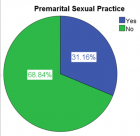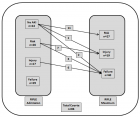About Nnamdi Azikiwe University
Nnamdi Azikiwe University
Articles by Nnamdi Azikiwe University
Perception of Nutrition and Exercise as a Tool in Controlling Cardiovascular Diseases among the Elderly in Anambra State
Published on: 3rd November, 2017
OCLC Number/Unique Identifier: 7286355386
The research investigated the perception of nutrition and exercise as a tool in controlling Cardiovascular Diseases (CVDs) among elderly civil servants in Anambra State of Nigeria. A total of 250 respondents comprising 150 elderly academic staff Nnamdi Azikiwe University Awka and 100 senior civil servants in the Anambra state civil service, who willingly, volunteered to participate in the study. Their ages ranged between 55-65 years purposively selected. The instrument for data collection was a self-structured questionnaire, with a reliability value of 0.73 using the test retest method. All data collected were subjected to descriptive statistics of frequency, percentages and chi square tested at 0.05 level of significance. Findings from the study showed that nutrition (diet) and exercise have significant effect in the prevention/control of (CVDs) among the elderly. It is therefore recommended that at the civil service secretariats, universities and other establishments/parastatals, should establish high standard eateries (restaurants) where qualified caterers, would regularly provide nutritious diet, at subsidized rate for workers in this category. In order to enable these class of workers have at least one good meal per day, in addition to a mandatory one- work-free afternoon (2.00pm-4.00pm) for routine/regular physical exercises for these class of workers.
Administration of Non-Pharmachologic Intervention in the control of Hypertension among selected volunteer retirees in Awka Metropolis Anambra State Nigeria
Published on: 6th November, 2017
OCLC Number/Unique Identifier: 7286357213
High blood pressure under medical palance is associated with a variety of circulatory diseases, and it has been estimated that over 12% of all deaths in the world is directly or remotely connected with hypertension. It is said that one out of every five persons, can expect to have high blood pressure at one time or the other, during one’s life time. Based on hemodynamic equation, the mean arterial pressure is equal to cardiac out-put, times resistance (p means=Q x R). Hence hypertension is usually as a result of either an increased cardiac output and/or an increased resistance. The most common form of high blood pressure in humans is called “essential hypertension”, while is said to have no known cause. However this research aims at showing how a 12-week moderate exercise with bicycle egometer (i.e., use of non-pharmacologic approach to reduce the resting heart rate and blood pressure of 6 volunteer retired civil servants from Anambra state civil service and 6 retired academic staff of Nnamdi Azikiwe university in Awka. The paired T-test analysis of data obtained revealed a statistical significant effect of the moderate 12-week exercise on bicycle egometer, on the resting heart rate and blood pressure of the experimental group of the respondents. Hence it could be concluded that the administration of moderate exercise on bicycle egometer could be an effective use of non-pharmacologic intervention in the control and prevention of high blood pressure or hypertension among the elderly.
Role of the Kidneys in the Regulation of Intra-and Extra-Renal Blood Pressure
Published on: 17th July, 2018
OCLC Number/Unique Identifier: 7814987529
Hypertension is one of the most common chronic diseases of human, affecting more than one billion people worldwide. When it becomes chronic, hypertension leaves behind cardiac hypertrophy, heart failure, stroke, and kidney disease, resulting in substantial morbidity and mortality. Treatments that effectively reduce blood pressure can prevent these complications. Abnormalities in the production of urine by the kidneys have been implicated in increased vascular resistance, leading to high blood pressure and increased cardiac mass. By matching urinary excretion of salt and water with dietary intake, balance is usually attained, thereby maintaining a constant extracellular fluid volume and blood pressure. Based on the capacity for the kidney to excrete sodium, this blood pressure-altering mechanism should have sufficient advantage to limit intravascular volume and consequently lower blood pressure in response to a range of stimuli from elevated heart rate to increase peripheral vascular resistance. A major determinant of the level of intra- and extra- renal blood pressure is therefore sodium handling, and it is controlled by complex physiological mechanism by hormones, inflammatory mediators, and the sympathetic nervous system. Homoeostasis and favourable influence sodium balance are a basic mechanism of efficacy for diuretics and dietary sodium restriction in hypertension. Renin Angiotensin System (RAS) inhibitors, vasodilators, and β-blockers work to facilitate pressure-natriuresis. Also, WNK signaling pathways, soluble inflammatory mediators, and pathways regulating extra-renal sodium disposition may be the focus towards elimination of sodium and reducing blood pressure in hypertension.
Evaluation of Thyroid and Lipid Profile of Hiv Patients Seen in a Faith-Based Health Facility in Anambra State, Nigeria
Published on: 1st August, 2023
Background: Human Immunodeficiency Virus (HIV) and thyroid function have been described. Prevalence pattern and atherogenic status significantly differ from HIV-negative control in several studies. Unfortunately, few studies have determined the prevalence of thyroid function and lipids among Nigerians living with HIV. Objective: This study is to evaluate thyroid hormones and lipid profiles in HIV-positive subjects attending a faith-based health facility in Anambra State Nigeria.Materials and methods: The serum concentration of Thyroid Stimulating Hormone (TSH), free Triiodothyronine (fT3), triiodothyronine (T3), free Thyroxine (fT4), Thyroxine (T4), Total Cholesterol [TC], Triglyceride [TG], High-Density Lipoprotein [HDL], Low-Density Lipoprotein [LDL] and Very Low-Density Lipoprotein [VLDL] was determined in 95 HIV positive subjects which include 48 patients who were on HAART- group 1 and 47 not on HAART- group 2; and compared to 30 HIV negative controls – group 3. Results: The level of TSH and fT3 was significantly (p < 0.05) higher in group 1 participants than in group 2 and the group 3 participants. The level of T4 was significantly higher in group 2 than in group 1 and group 3 participants. The level of T3 was significantly lower in Control participants in comparison to both HAART and non-HAART participants. The prevalence of fT4 dysfunction across the groups was significantly different from each other. The total mean of Cholesterol (163.5 ± 22.7), Triglyceride (163.5 ± 22.7), and Very Low-Density Lipoprotein (14.2 ± 2.4) of the HIV-positive participants were significantly (p < 0.05) lower than that of the HIV negative participants.Conclusion: The results obtained from this study indicate that serum levels of thyroid hormones may be used as baseline periodic markers during antiretroviral therapy and many people living with HIV may benefit from supplementation if appropriate.
Experiences of Consumers on the Health Effects of Fake and Adulterated Medicines in Nigeria
Published on: 4th July, 2024
Medicines are used to cure and treat ailments, relieve or eliminate disease symptoms, and slow down the disease process. Any attempt to disrupt this natural medicine process, using falsified medications, spells doom to a consumer of such medication. The challenge of fake medicines is a global one and affects developing and developed nations and currently assumes great significance as a result of globalization challenges, which have flattened the entire world, hence removing barriers to the movement of products and services. The cross-sectional survey was conducted, using six local government areas of Anambra State in South-East Nigeria, namely Awka, Nnewi, Onitsha, Aguata, Ogbaru, and Anaocha, among adults aged 18 years and above. A minimum sample size of 500 was calculated and stratified sampling was employed to select respondents in order to ensure that various population groups, the upper class, middle class, and lower class were represented.This research has shown that falsified medicine is an evil wind that blows nobody any good. It negatively affects every aspect of the citizen’s livelihood, ranging from their health, which manifests as treatment failures, deformities, loss of life to death, to loss of confidence in the healthcare providers, revenue losses to individuals, healthcare providers, manufacturers, and finally corruption of the genuine medicines supply chain with fake and adulterated medicines.The study has clearly shown the experiences of residents of Anambra State, South-East Nigeria with fake and adulterated medicines and also services as a wake-up call to medicines regulators like NAFDAC, PCN, the PSN, and Federal Ministry of Health to declare a state of emergency on the fight against fake and adulterated medicines and make enabling laws that are punitive enough towards the fight against this scourge, so that the healthcare and well-being of Nigerians would be assured at all times.
Fabrication and Optimization of Alginate Membranes for Improved Wastewater Treatment
Published on: 27th January, 2025
Alginate, a naturally occurring biopolymer extracted from brown algae, presents a promising avenue for developing sustainable and efficient membranes for wastewater treatment. This review comprehensively examines recent advancements in the fabrication, modification, and application of alginate-based membranes for effective water purification. The paper delves into various fabrication techniques, including casting, electrospinning, and 3D printing, which influence the structural and functional properties of the resulting alginate membranes. To enhance performance, strategies such as crosslinking, incorporation of porogens, and surface functionalization are employed. These modifications optimize crucial properties like mechanical strength, porosity, selectivity, and antifouling resistance. Furthermore, Response Surface Methodology (RSM) has emerged as a valuable tool for systematically optimizing fabrication parameters, enabling researchers to identify optimal conditions for achieving desired membrane characteristics. The integration of alginate membranes with biological treatment processes, such as phycoremediation (utilizing microalgae) and mycoremediation (employing fungi), offers a synergistic approach to enhance wastewater treatment efficiency. By immobilizing these microorganisms within the alginate matrix, their bioremediation capabilities are amplified, leading to improved pollutant degradation and nutrient removal. In conclusion, alginate-based membranes demonstrate significant potential as a sustainable and effective technology for wastewater treatment. Continued research and development, focusing on optimizing fabrication processes and exploring innovative integration strategies with biological systems, will further advance the application of alginate membranes in addressing the pressing global challenge of water pollution.

HSPI: We're glad you're here. Please click "create a new Query" if you are a new visitor to our website and need further information from us.
If you are already a member of our network and need to keep track of any developments regarding a question you have already submitted, click "take me to my Query."


















































































































































